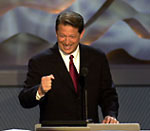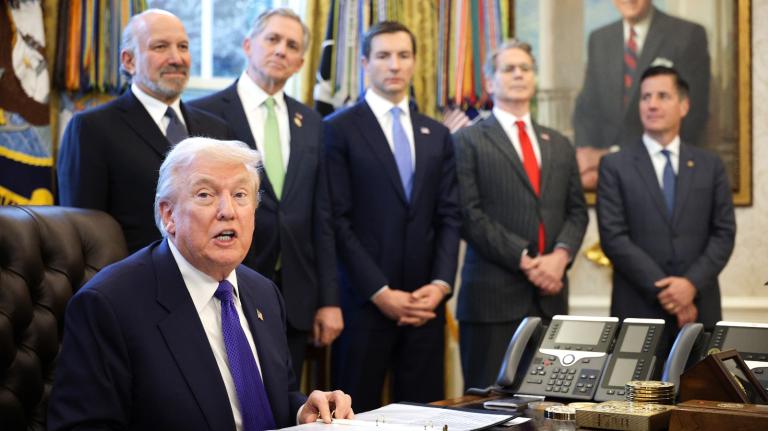LOS ANGELES, Calif. With much fanfare and an excess of recyclable confetti, Democrats sent Al Gore forth last night into what will be a grueling three-month campaign stretch. The vice president must convince skeptical voters that he has what it takes to lead and that electing him over Texas Gov. George W. Bush will make a real difference.

Those towering challenges were plainly evident in Gore’s acceptance speech before a boisterous crowd inside the Staples Center.
Gore touched on the environment, though it certainly wasn’t a cornerstone of his address. In his first mention of an issue he had tackled in Congress, he cited his fight against “big polluters,” which he said began because he was concerned over the dumping of toxic waste in his home state of Tennessee. “Our children should not have to draw the breath of life in cities awash in pollution,” he said, perhaps alluding to certain Texan metropolises.
“On the issue of the environment, I’ve never given up, I’ve never backed down, and I never will,” he continued. “And I say it again tonight: We must reverse the silent, rising tide of global warming, and we can.”
There was a muted reaction from the audience. “Not much of an applause line,” one reporter quipped. And he was right. But it was hard to tell whether it was the topic or simply the delivery, which was often a bit muddled.

Al Gore, giving them more.
© Panoramic Visions.
Gore got more hearty cheers when he pledged that free trade must be “fair,” ending child labor, protecting workers, and preventing “the poisoning of the environment.”
Before digging into the issues, Gore attempted to verbally chase President Clinton into the shadows for good.
“I stand here tonight as my own man,” the vice president declared, even as the cloud of the seemingly immortal Lewinsky scandal threatened to cast a shadow over Gore’s moment in the sun. “I want you to know me for who I truly am,” he said, in a line that sounded a bit desperate coming from a man who has been in public life for 25 years.
Gore then pivoted from the personal to the political, reaching into the arsenal of issues he must wield skillfully if he is to fend off a candidate whom voters clearly view as a more charismatic and appealing leader.
“I believe people deserve to know specifically what a candidate promises to do,” Gore said, mentioning a couple of traditionally Democratic issues, health care and child care, before tossing in two hugely popular items generally associated with Republicans: ending the marriage tax penalty and reforming the estate tax.
Finally, the veep brought out the sharp knives to slice and dice Bush’s tax cut proposal.
While Gore stepped on some applause lines, the buzz inside and outside the convention hall was that he had done a solid job that should help voters, those who tuned in anyway, get some idea of the distinct choice they face November 7.
Despite his good performance, the electoral map is looking fairly grim for Gore with several states that should be firmly in the Democratic column appearing to hang in the balance while the GOP base seems solid. And looming over it all this week was the specter of a man who was 3,000 miles away attacking MasterCard for filing a copyright lawsuit against his campaign.
Nader’s Raiders
Ralph Nader didn’t make any surprise visits here, as he did at the GOP convention in Philadelphia earlier this month, nor did he pop up at the Shadow Convention being held seven blocks away from the Staples Center in a sweaty, old auditorium. But his presence was felt, particularly as the Gore campaign hauled out its newest gun in the block-Nader effort — Katie McGinty, former chair of the White House Council on Environmental Quality.
McGinty held forth at length on Wednesday about the danger Nader poses, saying a vote for the Green Party nominee amounts to a vote for Bush. Flanking McGinty was Natural Resources Defense Council attorney Robert F. Kennedy, Jr., who for the first time gave some indication of the electoral damage the Gore camp fears Nader could inflict. Kennedy reeled off five states with 72 electoral votes that Democrats fear could swing to Bush if Nader racks up any serious numbers.
“His candidacy poses a serious threat to the environment in this country,” Kennedy said. “It is going to be a close election. Those electoral votes could turn the tide. [Nader’s] rationale has been that there really is no difference between Al Gore and George W. Bush, and if you examine the record that simply isn’t true. There is a gulf of difference”
Muckraker was sitting in the audience at the sparsely attended McGinty/Kennedy news conference (which attracted perhaps eight of the 15,000 reporters who were allegedly creeping around Tinseltown this week) next to Democratic National Committee spokesperson Jenny Backus, who explained that McGinty will be paid by the Democratic National Committee to work as a consultant to the Gore campaign.
All the Gore-y Details
McGinty was not the only surrogate making the rounds and trumpeting Gore’s environmental record. EPA Administrator Carol Browner dropped in for a chat on Washingtonpost.com and dismissed any critique of Gore’s record.
“Vice President Gore has been at the forefront of every major environmental and public health fight in this country for more than a decade — in the House of Representatives, in the Senate, and as vice president,” Browner said. She continued:
Under his leadership, the administration has cleaned up more — three times more — of the largest toxic waste dumps than the Reagan and Bush administrations together. He has led the way in fighting the Republicans in Congress who sought not once, but twice, to literally shut down the EPA, denied funds for enforcement of environmental standards for air and water pollution, toxic waste cleanups, and even went so far as to adopt environmental riders that would have specifically prohibited EPA from enforcing environmental requirements on the largest polluters. Make no doubt about it, Al Gore and Joe Lieberman are true environmental leaders, have been and will be.
She said a mouthful.
The Shadow Nos
Overall, the environment got a lot of play both inside and outside the convention hall, especially in comparison to the near shut-out at the GOP convention, with prominent mentions in many speeches and a handful of demonstrations. Oddly, however, the environment was almost completely absent from the otherwise colorful Shadow Convention, which was dominated mainly by discussion of campaign finance reform, the failed war on drugs, and other topics. There was one woman who complained of being poisoned by the pesticide methyl bromide, but for the most part green issues were overlooked, something noted by several delegates in attendance.


